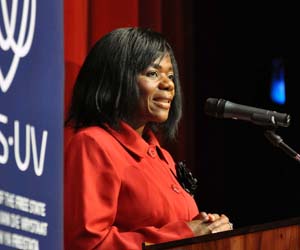 Advocate Thuli Madonsela speaking at the Law Symposium on corruption. |
The Faculty of Law, Centre of Business Law held a symposium on corruption in the public sector. The symposium took place on 5 June 2014 in the CR Swart Auditorium on the Bloemfontein Campus.
In her keynote address, Public Protector Adv Thuli Madonsela highlighted the government’s efforts to curb the high rate of corruption prevalent in the South African public sector. She also pointed out the effect it has had on service delivery, especially in municipalities and key government departments.
This highly-anticipated event drew a large group consisting of members of the public, the judiciary, government, non-governmental organisations, as well as the business and academic sector.
Responding to questions from the floor, Adv Madonsela spoke of corruption as an on-going problem that should be tackled in a collective effort by government officials and the public alike. “Whistleblowers are our main hope in fighting corruption … The Protected Disclosures Act protects them … it is also management’s responsibility to protect whistleblowers,” she said.
The symposium featured several well-respected names, including:
• Prof Jonathan Jansen, Vice-Chancellor and Rector;
• Honourable Justice I van der Merwe, Judge of the Free State High Court and Chairman of the Council of the UFS;
• Honourable Justice FDJ Brand, Judge of the Supreme Court of Appeal; and
• Prof JJ Henning, Acting Dean of the Faculty of Law.
Other high-ranking legal professionals from the office of the Director of Public Prosecutions, PriceWaterhouseCoopers, the Free State High Court and the Institute of Security Studies attended the event.